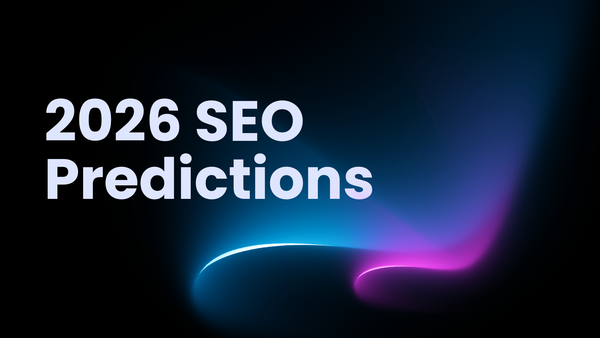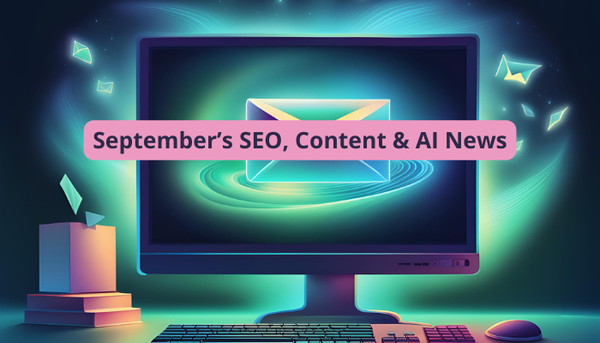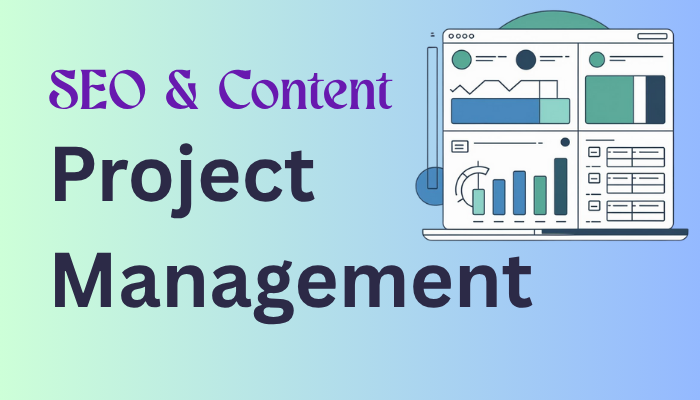Ecommerce SEO for AI Search: How to Optimize for Product Discovery in LLMs
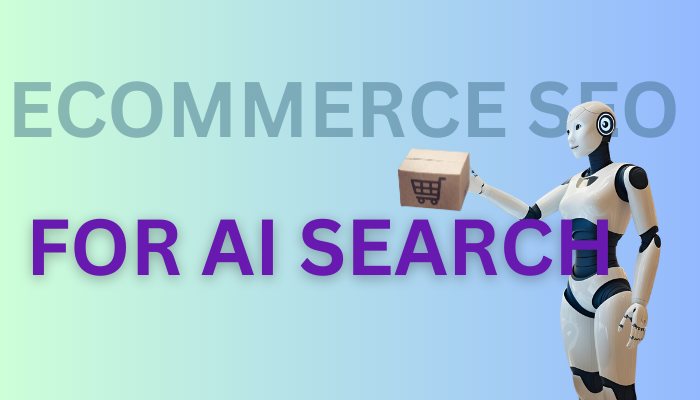
Babe, wake up, the new ChatGPT just dropped....
You should pay attention to this if you have a product for sale (basically everyone) as this applies to both physical and digital goods.
Ecommerce is entering its AI era, and it's moving fast.
ChatGPT has started surfacing product images directly in search results (as well as Perplexity which is tied to OpenAI's ChatGPT)
While the rollout still feels a bit sporadic in my tests, this has the potential to dramatically shift how people shop online. Why? Because the shopping experience is fundamentally different from Google’s product search.
Google Shopping is largely driven by sponsored listings. It prioritizes what advertisers pay to be seen, not necessarily what’s most useful or trusted by the consumer. In contrast, ChatGPT takes a more personalized and content-rich approach. It surfaces products based on aggregated reviews, "expert" recommendations, and community discussions, then tailors results to your personal preferences using memory (when available) and user-provided context.
For example, when I searched for cookware recommendations through ChatGPT. It provided me with a nice visual of products as well as a list with more details:
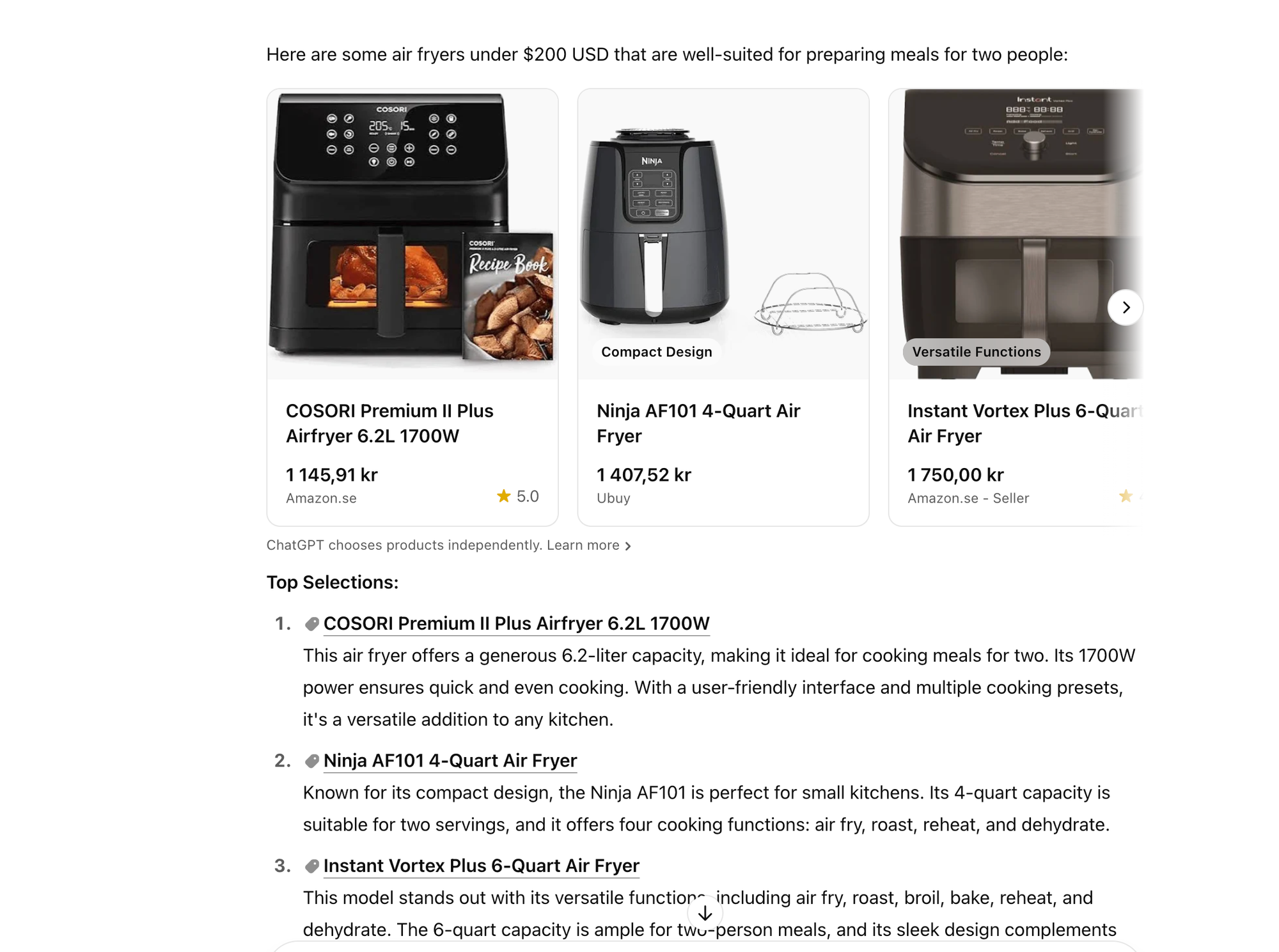
A search for products on ChatGPT. Note the existing drawback: I specified USD and got a list of products in SEk, where ChatGPT deliberately felt like it should prioritize my location over my specific request.
Perplexity (below) however either didnt take my location into account, or weighed my specific request for USD more heavily. When I left out location specific information and just asked for air fryer recommendations it defaulted to US, so my guess is that Perplexity is less focused on browser's location. When I specified my location it did provide specific results.
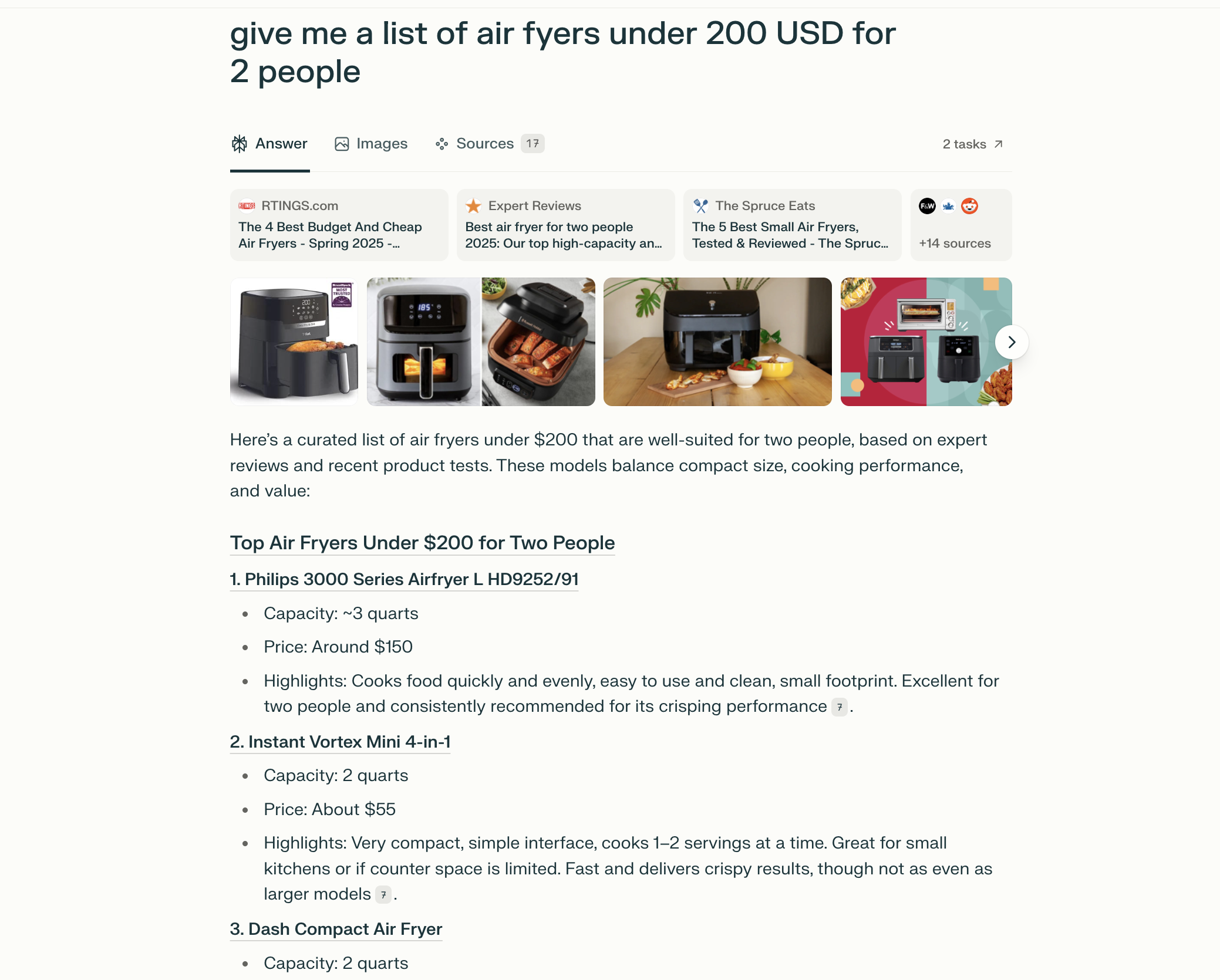
Sources cited and why it matters:
When I ran the search, ChatGPT generated a list of non-sponsored products based on editorials from Serious Eats, Good Housekeeping, and Reddit threads in r/Cooking. These results weren’t limited to what companies had paid to promote—they reflected real conversations and up-to-date reviews across the web. This is similar to my earlier findings on optimizing for AI search.
Even more notably, ChatGPT surfaced product types that typically get filtered out of Google’s ecosystem altogether (like vape pens and other nicotine-related products that are restricted in Google Shopping) This opens up a huge conversation around what it means to optimize for AI-led discovery platforms versus traditional search.
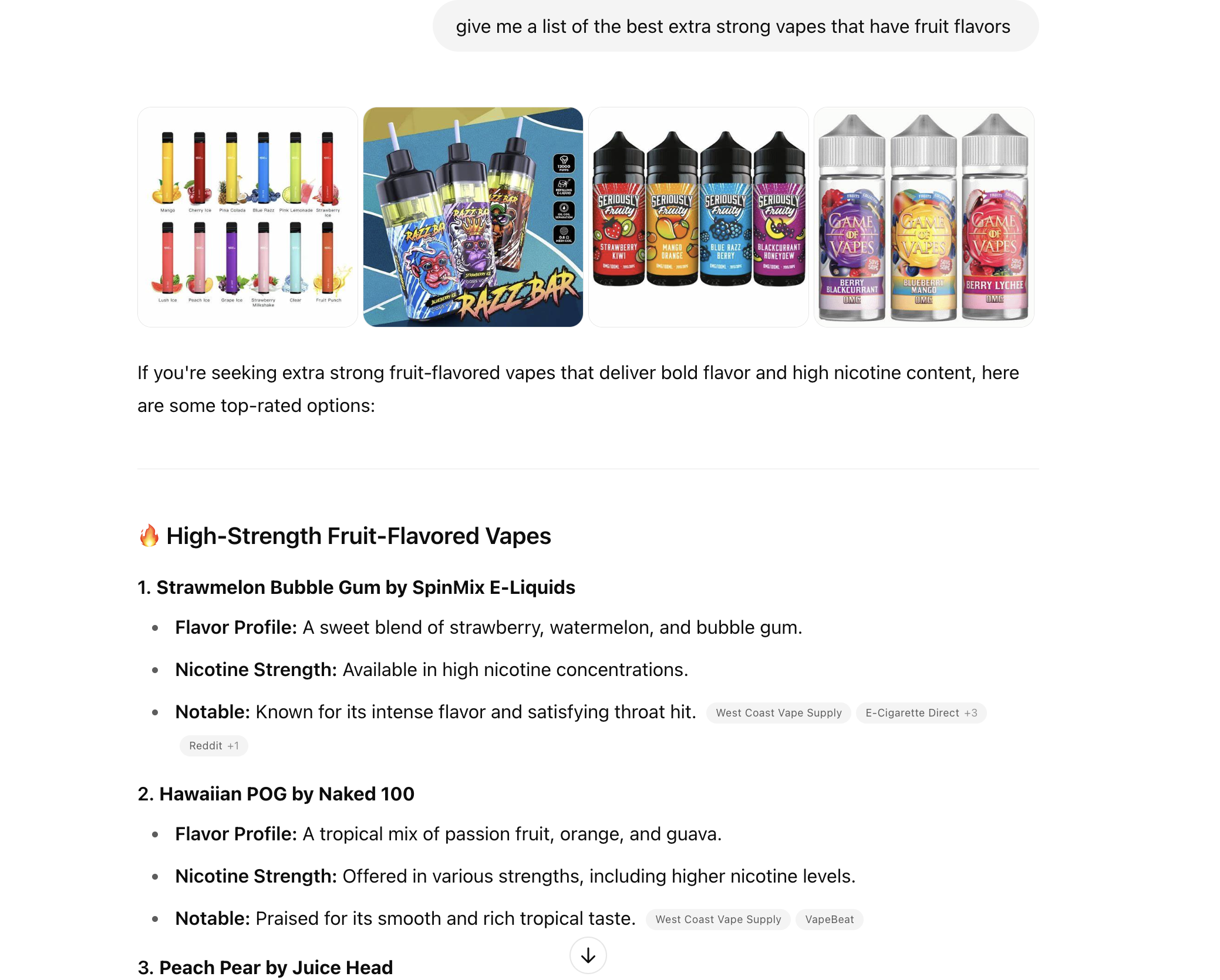
This isn’t just a paid search problem...
What happens when consumers start preferring unsponsored, context-aware product results over what’s available on traditional search engines? We’re looking at a scenario that could not only shrink ROI for paid advertisers but also shake up organic ecommerce strategies, especially for brands relying on top-of-funnel visibility through Google.
And it doesn’t stop with physical products.
I also tested digital products, specifically, mental health SaaS tools. ChatGPT recommended a curated set of apps like Headspace, Moodpath, and Insight Timer, sourcing recommendations from a range of high-authority editorial sites like ChoosingTherapy.com, Glamour, and The New York Times, as well as Reddit’s r/MentalHealth.
How does ChatGPT actually decide what products to recommend?
OpenAI has outlined some criteria in their documentation: they consider factors like product price, the user’s preferences and history, and availability. But when you dig into the sources being cited in these results, there’s a much clearer pattern to how products are selected and ranked:
- Top list articles dominate: for example queries like “Best noise-cancelling headphones under $200” or “Top 10 air fryers for small kitchens.” These lists are generally from editorial sources or affiliate-driven content hubs.
- Recency is heavily weighted. In most cases, 80% of the articles cited were published or updated in the past 2–3 months.
- Evergreen community discussions still make the cut. A Reddit thread titled “Best budget air fryer?” from two years ago appeared in the results because it matched my query exactly. This means the results may not always be the most relevant as prices are highly likely to change since then, but until the system improves, age doesn't matter here.
- Editorials and reviews matter, even if they’re affiliate-based. OpenAI and Perplexity still surfaces sources that are clearly monetized, showing that AI isn’t necessarily biased against paid content, it just doesn’t prioritize it the same way Google does.
- Surprise: Pinterest Pins show up. Not just the blog post behind the pin, but the pin itself. One example I saw was a pin titled “Top budget air fryers” with only one heart yet it appeared in the discovered sources list. This indicates that keyword alignment in pin titles and visual media is enough to get indexed and surfaced.
Example of a Pinterest Pin ChatGPT prioritized as a citation
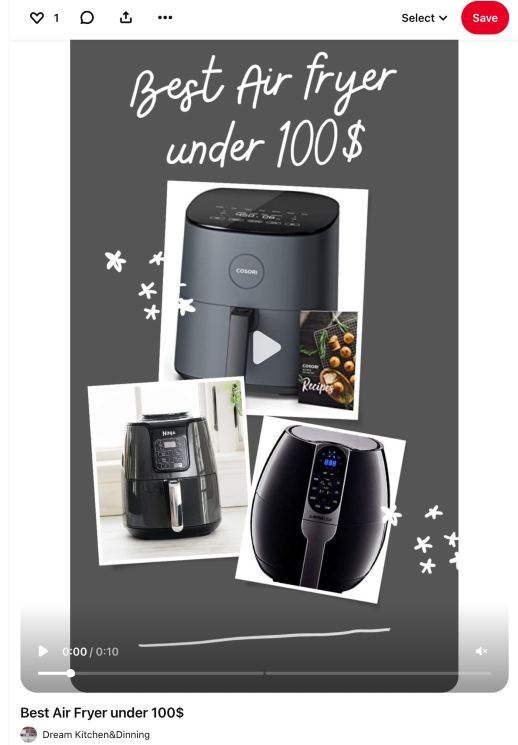
Strategic recommendations for ecommerce AI optimization
If your ecommerce or digital product relies on visibility in organic search or paid listings, this shift matters a lot. Here’s what I’d recommend doing right now:
Rethink authority: prioritize citations over backlinks.
The most immediate move you can make is to create a presence across authoritative platforms where your products can be recommended. That means:
- Pitching your products for inclusion in “best of” lists on editorial websites. These might not always include the coveted "do-follow" backlink and instead be hidden behind affiliate links.
- Seeding product discussions on Reddit (ethically and transparently, of course😉 )
- Partnering with bloggers and affiliate publishers who create content-rich review articles
- Getting mentioned in roundups by niche publications in your vertical
In traditional SEO, links that appear “paid” could harm your rankings, and affiliate links are basically pointless. But here a citations is a citations and that's meaningful for AI optimization. OpenAI doesn’t seem to penalize for affiliate links or disclosed sponsorships. The more presence you have across respected sources, the more likely you are to surface in ChatGPT’s recommendations.
Influencer strategy ≠ social-only strategy.
Influencers matter here, but not necessarily in the way you might expect. Right now, OpenAI doesn’t appear to crawl TikTok, Instagram, or Threads in a meaningful way. However, it does pull from YouTube descriptions, blogs, and reviews, and this may change at any time.
So if you’re investing in influencer marketing, prioritize creators who also have:
- A blog or media site with product writeups
- A YouTube channel with detailed product demos
- A presence on Reddit or Quora where they actively discuss products
- Also consider people who have social presences as well as the above, because it is likely these will be valued here soon.
Pinterest SEO: yes, really.
“Pinterest SEO” has big scammy webinar energy. But here’s how to actually do it well:
- Create list-style blog content (e.g., “5 Yoga Mats for Tall People”)
- Design pins with the exact search phrase in the image, title and description. If relevant also place it in a board tied to similar keywords. For example "Cookware Product Reviews" if you're pinning a post about an airfryer.
- Link directly to the blog post or third-party article that mentions your product
- When an influencer writes about your product on their site also make a pin that links to their article, you still get the credit
Pins don’t need to go viral to be useful. They just need the right keywords in the right places.
On-site optimization still matters.
Don’t throw away your technical SEO strategy just yet. ChatGPT does crawl actual product pages and incorporates data submitted by merchants. So:
- Make sure your schema markup is accurate and complete (product, price, review, availability, etc.)
- Use structured data for FAQs, how-to guides, and other helpful formats
- Optimize your product categorization for conversational search (e.g., “gifts under $50” or “eco-friendly water bottles”)
ItemList structured data to blog-style listicles.If you create a post like “10 Gifts for Coffee Lovers Under $30,” including
ItemList schema helps ChatGPT and other LLMs better understand the list structure and relationships between the items.
Pair this with Product schema for each item and use clear item names and short blurbs that describe use cases (e.g., “great for early risers” or “best for travel”).
Use Google’s Rich Results Test to verify your structured data is implemented correctly and eligible for enhanced results.
Better yet, start publishing internal product listicles on your own site. Use formats like:
- “Best under $X” guides
- Feature comparisons
- Seasonal roundups
These not only help with traditional SEO—they’re now indexable and potentially surfacing in AI results.
LLMs + Shopping = A Middle-Funnel Shortcut
One of the biggest shifts introduced by LLMs is how they compress the research phase of shopping. Traditionally, buyers would open a dozen tabs (Wirecutter for reviews, Reddit for real-life opinions, YouTube for demos, and Quora for edge-case questions) Now, with tools like ChatGPT, all of that gets synthesized into one conversational step.
In other words: the awareness and consideration stages are blending. ChatGPT doesn’t just tell you what a product is, it tells you how it compares, who recommends it, and why it might be the best fit for you.
This shift changes how and where you need to show up.
To take full advantage:
- Bring external validation into your product pages.
LLMs cite sources. If your site features expert quotes, media mentions, or snippets from customer reviews directly on the product page, it increases the chance that ChatGPT can reference and prioritize your page. Don’t just rely on press hits or testimonials living elsewhere, embed them where product decisions happen. - Add comparison tables and decision-support content.
If you sell multiple models, sizes, or product types, create structured comparison tables. Include differentiators like “best for travel,” “most durable,” “lightest weight,” or “entry-level option.” These help both the user and the AI summarize product differences more easily, increasing the odds your listings are interpreted as helpful and authoritative. - Use buyer-intent language that maps to real queries.
Phrases like “ideal for remote workers,” “budget-friendly starter kit,” or “top-rated for sensitive skin” mirror how people actually search. When your product descriptions use those same signals, LLMs are more likely to match your page to specific user needs during recommendation.
This new behavior shifts product discovery closer to product decision than ever before, and if your content bridges that gap effectively, you don’t just show up - you become the default choice.
Geo Optimization:
LLMs like ChatGPT and Perplexity don’t always personalize results based on your location, unless you explicitly prompt it. That means if a user in Canada searches for “best hair masks for dry winter weather,” they might get product recommendations that are only available in the U.S. unless they specify otherwise.
This has important implications for ecommerce brands with international audiences. If you're serving more than one market, you can’t assume AI will geo-target for you. You need to make it easy for the model to surface relevant, regional content.
Here’s what to prioritize:
- Create region-specific content and product roundups.
Instead of one generic list, publish localized versions like “Top Vegan Snacks in the UK,” “Best Sunscreens for Australian Summers,” or “Budget Fitness Gear in Canada.” Use specific country names, currency symbols, and cultural context where relevant. Bonus points if your product roundups include local delivery timeframes or seasonal tie-ins. - Get featured on regional forums, review sites, and publications.
LLMs index platforms like Reddit, editorial sites, and niche blogs - so being mentioned on a UK-based review site or an Australian lifestyle blog can directly influence what shows up in region-specific queries. It’s not just about domain authority anymore; geographic relevance plays a big role in whether your product appears in a location-specific search. - Include geographic indicators on your product and category pages.
This doesn’t mean stuffing in “USA” or “UK” for the sake of it, but using natural phrases like “Ships across Europe,” “Certified for UK regulations,” or “Free shipping in Australia” can help clarify regional relevance to both users and crawlers.
This is also a strong case for applying international SEO principles even if you’re optimizing for AI tools rather than search engines alone. Use hreflang tags where appropriate, localize pricing and currency, and consider subfolders or subdomains if you serve multiple markets.
ChatGPT won’t know your site has region-specific relevance unless you show it. Treat regional targeting as a layer of discoverability - not just a conversion play.
Other Important Considerations
Personalization Will Get Deeper—and Stickier
OpenAI’s memory capabilities aren’t just for chat history. Over time, as memory expands and refines, product recommendations will become more persistent and tailored. That means:
- If a user asks for budget cookware today and premium options next month, ChatGPT may remember the user’s price range, dietary preferences, or aesthetic preferences and evolve its recommendations accordingly.
- Businesses may eventually need to consider not only how to appear once, but how to become the go-to recommendation over time.
Right now, memory is still being adjusted and optimized - but this is worth watching. You could mention this as a reason why product category presence matters beyond just "one good placement."
OpenAI’s Plugin and Browsing Mode
It’s worth noting:
- If plugins resurface (they’re being merged into tools), it opens potential for product listing integrations through third parties like Klarna, Instacart, or Shopify.
The bottom line:
AI search is less about how many links you have, and more about where those links live and what they say.
You don’t need to be everywhere. but you do need to be somewhere useful.
Put your budget and effort toward visibility on platforms ChatGPT trusts. Build real citations, lean into partnerships, and embrace new formats like product listicles and Pinterest - even if they’ve felt low ROI in the past.
This is the new SEO battleground, and the brands that adapt early are going to have a serious edge.
Want help optimizing for AI search? Work with me.


